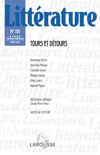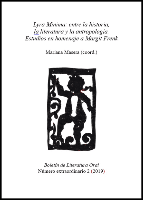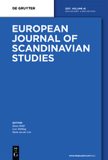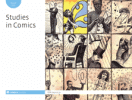
FABULA
Scope & Guideline
Deepening Understanding of Cultural Narratives
Introduction
Aims and Scopes
- Narrative Analysis and Theory:
FABULA emphasizes the analysis of narrative structures, exploring how stories are constructed and the theoretical frameworks that underpin them. This includes investigations into the morphology of tales, narrative typology, and the relationship between narrative and social context. - Folklore and Cultural Studies:
The journal features research that delves into folklore traditions, examining how cultural narratives evolve, their significance in society, and their role in cultural identity. It often highlights the interplay between folklore and contemporary cultural phenomena. - Interdisciplinary Approaches:
FABULA encourages interdisciplinary research, integrating perspectives from literary studies, anthropology, psychology, and digital humanities to enrich the understanding of narratives and their functions. - Historical Contextualization:
A core aim is to place narratives within their historical contexts, analyzing how stories reflect and shape cultural and social realities over time, including the impact of historical events on narrative forms. - Digital Narratives and Technology:
The journal also addresses the impact of technology on storytelling, exploring digital narratives, computational analysis of folklore, and the role of social media in contemporary narrative practices.
Trending and Emerging
- Populism and Cultural Narratives:
There is a rising interest in exploring the relationship between populism and narratives, particularly how cultural narratives shape and reflect populist movements. This theme is crucial for understanding current sociopolitical dynamics and the role of storytelling in public discourse. - Digital Storytelling and Technology:
The journal has increasingly focused on the intersection of narrative and digital technology, examining how digital platforms transform storytelling practices. This theme is significant as it addresses the evolving landscape of narrative forms in the digital age. - Interdisciplinary Research:
An emerging trend is the incorporation of interdisciplinary approaches, where researchers blend folklore studies with psychology, sociology, and literary theory. This trend enhances the complexity of narrative analysis and broadens the scope of inquiry. - Narratives of Marginalized Voices:
FABULA is witnessing a growing emphasis on narratives that represent marginalized voices, including subaltern perspectives. This shift is vital for inclusivity in narrative studies and for understanding diverse cultural expressions. - Environmental Narratives:
An emerging focus on environmental narratives highlights how storytelling can address ecological concerns and cultural attitudes towards nature. This theme is increasingly relevant as global environmental issues become more pressing.
Declining or Waning
- Traditional Folklore Studies:
There appears to be a decreasing focus on purely traditional folklore studies, particularly those that do not engage with contemporary contexts or interdisciplinary methods. As scholars increasingly seek to connect folklore with modern narratives, traditional approaches may be viewed as less relevant. - Static Historical Narratives:
Research centered solely on static historical narratives, without consideration of their dynamic cultural implications or transformations, seems to be diminishing. The trend is moving towards a more fluid understanding of narratives that acknowledges change and adaptation. - Single-Country Focus:
The journal has seen a decline in studies that concentrate on folklore or narratives from a single country without comparative analysis. There is a growing preference for cross-cultural studies that examine narratives in a global context. - Obituaries and Individual Biographies:
While obituaries of notable figures in folklore studies have been published, the frequency of such articles has decreased, possibly indicating a shift towards more theoretical and broad-ranging research topics rather than biographical or commemorative pieces. - Narrowly Defined Genre Studies:
The focus on narrowly defined genres, such as specific types of fairy tales or fables without broader implications or connections to other narrative forms, seems to be waning as researchers pursue more comprehensive and integrative approaches.
Similar Journals

Cahiers de Narratologie
Decoding the Language of StoriesCahiers de Narratologie is a distinguished academic journal dedicated to the study of narratology, published by the Laboratoire Interdisciplinaire Récits, Cultures, & Sociétés (LIRCES). Since its inception in 2001, this Open Access journal has provided a vital platform for researchers, scholars, and students to explore and disseminate knowledge on narrative theory and its multifaceted applications across various disciplines. With a commitment to fostering interdisciplinary dialogue, Cahiers de Narratologie features rigorously peer-reviewed articles, critical essays, and innovative research that delve into the complexities of narrative structures, practices, and effects in contemporary culture. As an essential resource for understanding the intersection of storytelling and cognition, this journal plays a significant role in shaping the field and supporting scholarly discourse on narratives. The journal is based at UNIV NICE-SOPHIA ANTIPOLIS, in the picturesque region of NICE, FRANCE, and continues to attract contributions from a global network of narrative researchers.

Verbum
Fostering Interdisciplinary Dialogue in HumanitiesVerbum is a distinguished academic journal published by the Pazmany Peter Catholic University, Faculty of Humanities, focusing on the realms of linguistic studies, literature, and cultural discourse. With its ISSN 1585-079X and E-ISSN 1588-4309, Verbum serves as a vital platform for researchers and scholars to disseminate their findings and engage in interdisciplinary conversations. Although currently not available as an open-access journal, its rigorous peer-review process and commitment to scholarly excellence have solidified its importance within the humanities field. Based in Piliscsaba, Hungary, this journal has previously been indexed in Scopus and continues to offer valuable insights into themes relevant to linguistics and cultural studies. Verbum invites contributions that explore transformative ideas, fostering a deeper understanding of language and identity in contemporary society, making it an essential read for academics, professionals, and students alike.

LITTERATURE
Advancing Critical Conversations in Literary Analysis.LITTERATURE is a distinguished academic journal published by LAROUSSE, dedicated to the exploration and critical discourse of literary studies. Based in France, this journal, with ISSN 0047-4800 and E-ISSN 1958-5926, serves as a vital platform for scholars, students, and professionals interested in both contemporary and historical literary theory. Despite its current categorization in the Q4 quartile of literature and literary theory for 2023, LITTERATURE aspires to elevate discussions within the field, providing a peer-reviewed environment for innovative research and theoretical exploration. The journal covers an extensive range of topics, including literary criticism, narrative theory, and cultural studies, ensuring it remains relevant in an evolving academic landscape. With an unwavering commitment to fostering scholarly communication, LITTERATURE invites contributions that challenge conventional perspectives and push the boundaries of literary analysis, aiming to bridge the gap between academic scholarship and broader societal narratives.

Boletin de Literatura Oral
Celebrating the Power of Oral Literature WorldwideBoletin de Literatura Oral is an esteemed academic journal published by UNIV JAEN, SERV PUBLICACIONES, dedicated to advancing the fields of Anthropology, History, Linguistics, and Literary Theory. With its Open Access model established in 2011, the journal ensures that valuable research reaches a global audience without financial barriers. Based in Spain, at the CAMPUS LAGUNILLAS in Jaen, this publication has been recognized for its rigorous scholarship, achieving a Q4 ranking in Anthropology and notable Q3 and Q2 rankings in related disciplines as of 2023. The journal thrives on its commitment to fostering interdisciplinary dialogue, serving as a vital resource for researchers, professionals, and students keen on exploring the rich tapestry of oral literature and its implications across cultures. The journal is indexed in major databases, underscoring its relevance and accessibility in the research community.

Acta Baltico-Slavica
Advancing Interdisciplinary Dialogue in Baltic StudiesActa Baltico-Slavica, an esteemed academic journal published by the Polish Academy of Sciences, Institute of Slavic Studies, serves as a vital platform for the exploration of Slavic cultures, languages, and historical narratives. Since its transition to Open Access in 2014, the journal has fostered inclusivity and accessibility, allowing researchers, professionals, and students to engage with cutting-edge scholarship in the fields of History, Linguistics and Language, and Literature and Literary Theory. With a commendable impact as indicated by its category quartile rankings (Q2 in History and Literature, Q3 in Linguistics), and Scopus rankings reflecting its significance within the academic community, Acta Baltico-Slavica not only contributes to the rich tapestry of scholarship surrounding the Baltic and Slavic regions but also encourages interdisciplinary dialogue. The journal’s commitment to advancing knowledge across its fields of study makes it a prominent destination for scholarly discourse and research inquiry.

Acta Literaria
Cultivating Insightful Analyses of Literary WorksActa Literaria is a distinguished journal published by the Universidad de Concepción, Facultad de Humanidades y Arte, focusing on the intricate domains of literature and literary theory. With an ISSN of 0717-6848, this Chilean journal has been a vital contributor to the scholarly discourse in its field since its inception in 2007. Although currently categorized in the Q4 quartile for the year 2023 and holding a Scopus rank of #860 out of 1106 in the Arts and Humanities section, Acta Literaria plays a crucial role in fostering dialogue and exploration among researchers, professionals, and students alike. The journal aims to facilitate the exchange of innovative ideas, critical analyses, and diverse perspectives on literature, making it an indispensable resource for anyone engaged in literary studies. While it does not offer open access, the journal's commitment to upholding academic rigor ensures that it remains a respected platform for scholarly publication.

CLIO-A JOURNAL OF LITERATURE HISTORY AND THE PHILOSOPHY OF HISTORY
Advancing Critical Inquiry Across Time and TextCLIO: A Journal of Literature, History, and the Philosophy of History, published by Indiana University-Purdue University, serves as a pivotal platform for scholars and students alike. Since its inception, this journal has offered a unique convergence of literary analysis, historical context, and philosophical inquiry, creating a rich dialogue across disciplines. With an ISSN of 0884-2043, CLIO has evolved alongside the academic landscape from its early days in the late 20th century, reflecting the changing paradigms of literature, history, and philosophical thought. Although currently categorized in the Q4 quartile across its three relevant fields—History, Literature and Literary Theory, and Philosophy—it continues to invite contributions that challenge traditional boundaries and foster interdisciplinary research. While not currently an Open Access journal, CLIO remains an essential resource for those invested in the critical exploration of historical narratives and literary expressions, appealing to all who seek to understand the intricate weave between past and present.

European Journal of Scandinavian Studies
Unveiling the nuances of culture, language, and literature.European Journal of Scandinavian Studies is an esteemed journal published by Walter de Gruyter GmbH, dedicated to advancing scholarship in the fields of Cultural Studies, Linguistics and Language, and Literature and Literary Theory. Since its inception in 2010, the journal has been a pivotal platform for researchers and scholars, showcasing cutting-edge research and critical discussions pertaining to Scandinavian languages and cultures. With an ISSN of 2191-9399 and an E-ISSN of 2191-9402, the journal emphasizes accessibility to impactful academic work, despite its current non-open access model. While the journal is categorized within the Q4 quartile for Cultural Studies and Linguistics/Language, it has shown notable potential in ranking higher in its specialized domains, fostering a growing community of researchers invested in Scandinavian studies. The journal's office is located in Berlin, Germany, further enriching its European scholarly context. As it continues to evolve, the European Journal of Scandinavian Studies serves as a vital resource for academics seeking to engage deeply with the multifaceted aspects of Scandinavian culture and linguistics.

Studies in Comics
Fostering Dialogue Between Text and ImageStudies in Comics, published by INTELLECT LTD, is an esteemed journal situated at the intersection of Literature and Visual Arts, with a dedicated focus on the comic form. Operating since 2019, this journal has quickly established itself as a respected resource in both the Literary Theory and Visual Arts and Performing Arts categories, boasting a commendable Q2 ranking in 2023 within these fields. With an ISSN of 2040-3232 and an E-ISSN of 2040-3240, it provides a platform for rigorous scholarship that explores the multifaceted dimensions of comics, promoting interdisciplinary approaches that enrich understanding and foster dialogue among researchers, professionals, and students. With a notable position in the Scopus Ranks, being in the 84th percentile for Literature and 73rd for Visual Arts, the journal is committed to advancing the study of comics as a significant cultural artifact and artistic medium.

Current Writing-Text and Reception in Southern Africa
Charting the Literary Landscape of Southern AfricaCurrent Writing-Text and Reception in Southern Africa is a premier journal published by Routledge Journals, Taylor & Francis Ltd., specializing in the vibrant field of Literature and Literary Theory. With ISSN 1013-929X and E-ISSN 2159-9130, this journal has been a pivotal platform for scholarly discourse since its inception in 1989, continuing through to 2024. Located in the United Kingdom, it emphasizes the uniquely diverse literary landscape of Southern Africa, making it an essential resource for researchers, professionals, and students who engage with the rich cultural narratives of the region. Ranking in the Q3 category for Literature and Literary Theory, it holds a commendable position in the Scopus ranks, situated at #424/1106 with a 61st percentile, highlighting its influence and relevance in academic discussions. Though not open access, this journal serves as a vital conduit for innovative research, critical analysis, and theoretical exploration, underpinning the significance of text and reception in contemporary literary studies.